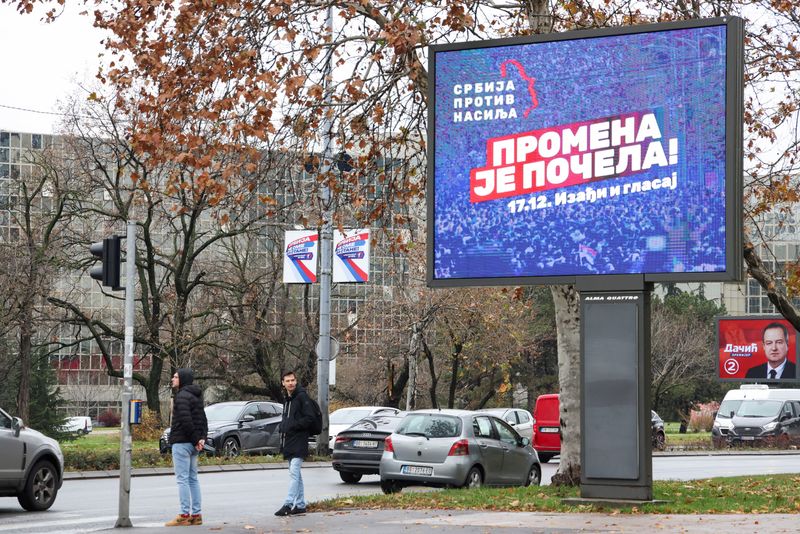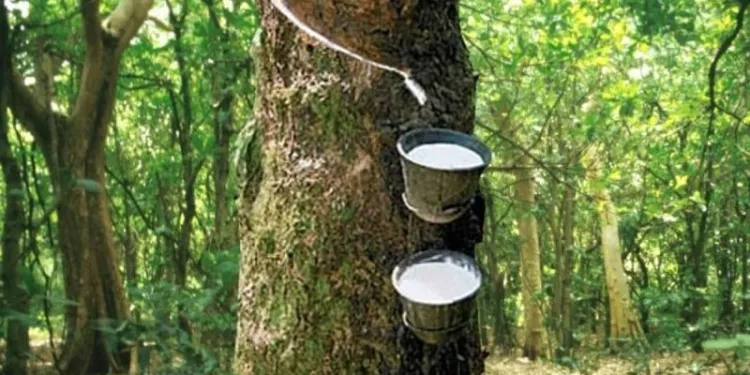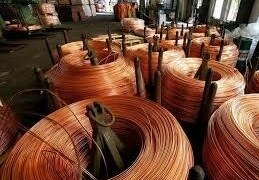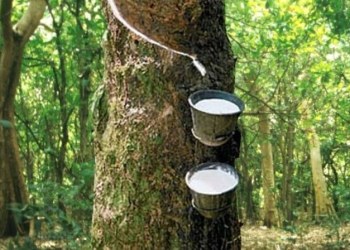
© Reuters. People stand next to a pre-election billboard of the opposition coalition ‘Serbia Against Violence’ in Belgrade, Serbia, December 14, 2023. REUTERS/Zorana Jevtic
BELGRADE (Reuters) -Serbians began voting on Sunday in a snap election seen as an effort by President Aleksandar Vucic and his populist Serbian Progressive Party (SNS) to secure another four-year term, after two mass shootings earlier this year rattled their popularity.
A total of 18 parties and alliances are vying for the support of the 6.5 million-strong electorate for 250 seats in the parliament. The threshold for entering the parliament is 3% of votes. Polls opened at 7 a.m. (0600 GMT) and will close at 8 p.m.
Though exit polls are prohibited by law, the first unofficial results from pollsters based on monitoring of counting at a nationwide sample of poll stations are expected after 9 p.m. (2000 GMT).
The state election commission is expected to announce full results in the coming days.
Two mass shootings in May, resulting in 18 deaths, including nine elementary school students, triggered protests that shook Vucic and the SNS’s decade-long grip on power. The dissent was exacerbated by rising inflation, standing at 8% in November.
Opposition parties and rights watchdogs also accuse Vucic and the SNS of voter bribery, stifling media freedoms, violence against opponents, corruption, and ties with organised crime. Vucic and his allies deny these allegations.
After voting in a school in downtown Belgrade, Dragan Djilas, a leader of the centre-left opposition alliance Serbia Against Violence, said “changes in Serbia have begun”.
“People are determined to live … normally, without crime and corruption, without prices going wild,” he said.
RULING PARTY LEADING POLLSThe parliamentary election, the fifth since 2012, coincides with local votes taking place in most municipalities, the capital Belgrade and the northern province of Vojvodina.
A recent pre-election opinion poll by the Nova Srpska Politicka Misao website placed the SNS and its alliance Serbia Must Not Stop in the lead with 39.8% of the vote, followed by Serbia Against Violence alliance at 25.6% and the Socialist Party (SPS) of outgoing Foreign Minister Ivica Dacic, a long-time SNS coalition partner, with 8.9%.
After voting in Belgrade’s Novi Beograd municipality, a suburb characterised by drab communist-era apartment blocs, Vucic said he was confident of victory.
“This is a major precondition for Serbia to continue on its path of prosperity and success,” he said.
Serbia, a candidate to join the European Union, must first normalise relations with Kosovo, its former predominantly Albanian province that declared independence in 2008 after a late 1990s guerrilla uprising. EU-brokered talks between Belgrade and Pristina are stalled, and tensions remain high.
Serbia must also root out corruption and organised crime, liberalize the economy, and align its foreign policies with those of the EU, including introduction of sanctions against its traditional ally Russia – due to its invasion of Ukraine.
Goran Popovic, 58, an engineer from Belgrade, said he was fed up with “too much thievery and corruption”.
But Draginja Savic, 77, a pensioner, also from Belgrade, was sticking with the ruling party.
“My sons were convincing me to vote for the opposition, but I am saying, no, the man (Vucic) is doing just fine,” he said.
Source: Investing.com

























